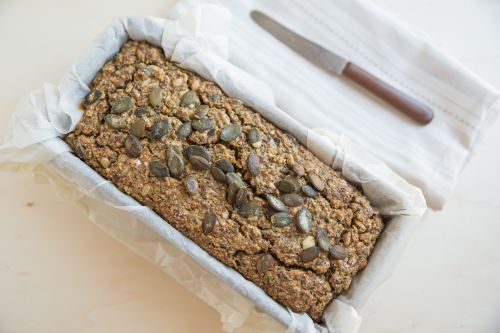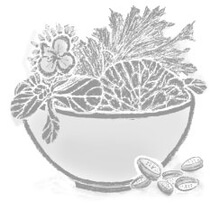ORGANIC Pumpkin seeds
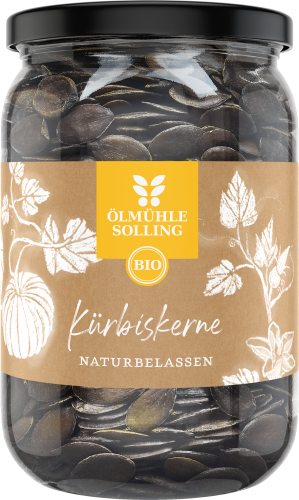

- Natural and unroasted
- sustainably packaged in a jar with a screw cap
- from controlled organic cultivation
- with valuable fiber
- for refining muesli and salads
- ideal as a snack
from 445 ratings
The natural pumpkin seeds come from controlled organic cultivation and contain valuable fiber. Their protein content and the minerals they contain make them ideal for a healthy lifestyle. Pumpkin seeds are very versatile in their use. They are ideal for muesli and for refining salads and vegetable dishes. They also add that certain something to soups, especially an autumnal pumpkin soup. Pumpkin seeds are an ideal baking ingredient for bread and rolls and are also a real treat and snack on their own.
Origin and history
Pumpkin seeds, the seeds of the pumpkin, have been known for over 7,000 years. They first spread beyond North and South America with the Americas and have since spread to all warmer regions of the world. Since the 16th century, human cultivation has contributed in particular to the rapid spread of this ancient crop.
The three most common types of pumpkin
Only five of over 800 known pumpkin species worldwide are cultivated, with the giant, garden and musk pumpkin being the most common in gardens. The pumpkin fruits can weigh more than 200 kilograms. This means that pumpkins produce the largest fruits. However, each pumpkin fruit always contains around 150 seeds, regardless of its size.
Strictly speaking, the pumpkin is not a fruit at all, but a berry. Because of its extremely hard skin, the pumpkin is also commonly known as the "armored berry", which contains the pumpkin seeds.
Harvesting pumpkin seeds
Pumpkins need 60-150 days until they are ready to harvest. They are usually harvested overripe between August and October so that the flesh can be removed more easily. The pumpkin seeds are separated from the flesh automatically or often by hand, washed and then dried. The seeds are then peeled and dried again.
Taste and use
With their mild, nutty flavor, crunchy pumpkin seeds go well in hearty dishes, muesli, salads, soups or as a snack between meals. They are also ideal for baking bread and rolls. They also taste slightly creamy due to their high oil content.
Small seeds with a big "heart-healthy" effect
Pumpkin seeds are the seeds of the pumpkin and contain valuable vitamins and enzymes and provide unsaturated fatty acids and minerals such as beta-carotene, magnesium, iron, zinc, selenium and phytosterols, their most valuable ingredients, which are said to be particularly effective in preventing and alleviating bladder and prostate problems. Pumpkin seeds are a good source of protein, containing approx. 30 g per 100 g.
Recipe
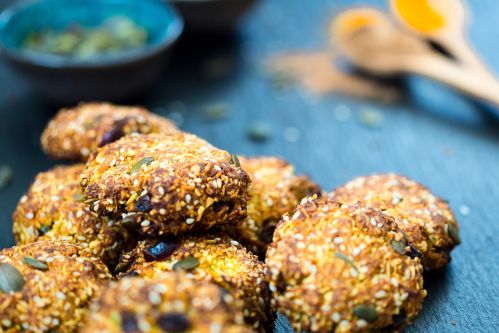
Turmeric cookies
Delicious cookies with turmeric powder, spelt flour and oats. Refined with sesame and pumpkin seeds. With raisins for natural sweeteness. zum Rezept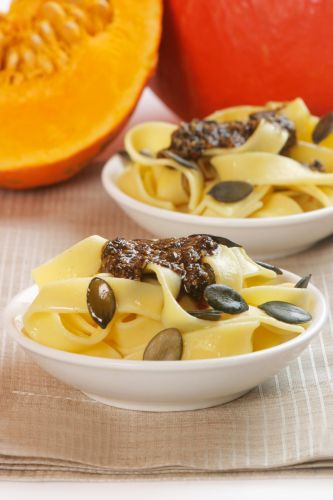
Pumpkin seed pesto with wild garlic
Quick recipe for pumpkin seed pesto with wild garlic. Prepared with pumpkin seeds and pumpkin seed oil. Goes well with spaghetti, linguine, gnocchi or baguette. zum Rezept